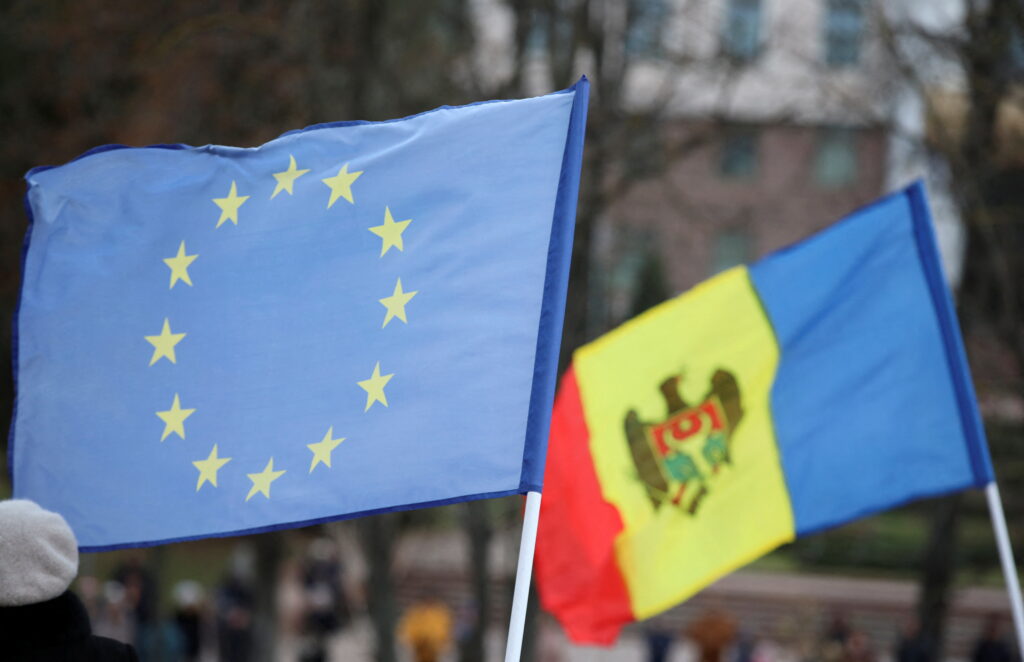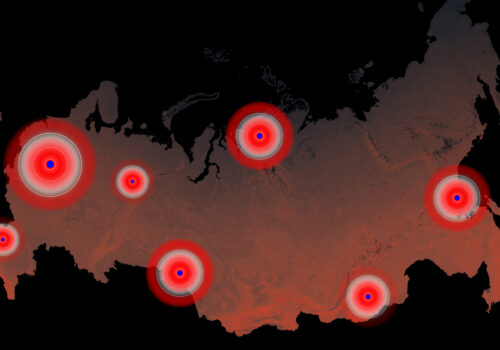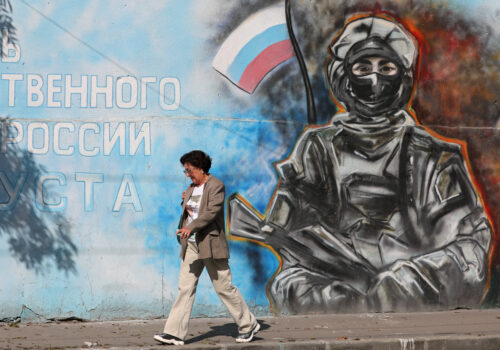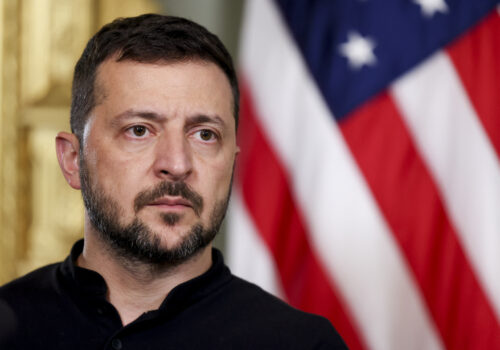CHIȘINĂU—There is a buzz in Moldova’s capital as it readies itself for what could be the most consequential elections in its post-Cold War history. In the first round of voting on October 20, Moldovans will both elect their president and determine whether the country will enshrine European Union (EU) membership as a strategic goal in its constitution. If none of the eleven presidential candidates wins more than half of the vote, the election will go to a second round on November 3.
The elections are a critical juncture for Moldova’s democracy and its Western course. The pro-European and reform-focused government remains popular, but it faces significant Russian attempts to destabilize the country and influence the election in Moscow’s favor. While Russia’s full-scale war in Ukraine rages on across the border, the Kremlin is also focused on Moldova. Moscow is increasing its hybrid warfare tactics, disinformation activities, and blatant interference efforts, all in an attempt to undermine the upcoming elections and derail Moldova’s pro-European trajectory. Officials and civil society organizations in Chișinău warn that Russia’s interference is having a significant negative impact on the country.
Last week, Moldovan authorities alleged that a large-scale vote-buying scheme in the country was being orchestrated from Russia. Moldovan police have accused Russia and Ilan Shor, a US-sanctioned, pro-Russian oligarch, of being behind the operation. The scheme reportedly involved an attempt to bribe at least 130,000 Moldovans with some fifteen million dollars in total. The goal was to sway the elections against Moldova’s current Western-oriented president, Maia Sandu, and to prevent the EU referendum from passing. Shor currently resides in Russia, having been convicted last year in Moldova in absentia for fraud and money laundering.
Sandu has pushed forward with her country’s European integration process, even amid Russia’s ongoing war in Ukraine and persistent and increasing Kremlin interference in Moldova. In 2022, Moldova was granted EU candidate status, and it has since entered EU accession negotiations. If the upcoming EU referendum fails, Moldova risks a blow to its pursuit of a European future and potentially severe political, economic, and social consequences. The referendum’s defeat could threaten the legitimacy of the pro-European forces in Chișinău and leave room for pro-Russian forces to further promote their views.
As a part of its influence campaign, the Kremlin is spreading malicious narratives to sow fear that a vote toward the EU will put Moldova on the same path as Ukraine. Russian-backed proxies and media outlets work to spread panic that turning toward the EU will ruin the country, erode its independence, and invite Russian troops over its borders, as the proxies and media outlets say Ukraine did with the Maidan Revolution in 2014.
Due to ongoing Russian meddling, internal political divides and tensions have worsened in Moldova, and most strikingly in the small autonomous region of Gagauzia, which is controlled by Shor’s pro-Russian political party. Moldova also faces persistent challenges in the Russia-friendly breakaway region of Transnistria. But common sentiment in Chișinău now is that Gagauzia presents a more acute threat of destabilizing the country, while Transnistria is interested in maintaining the status quo. Shor has taken advantage of the Gagauzia region’s poverty and Russian-speaking population to further promote his party and cause, building a pro-Russian network there, especially among the large pensioner community.
Earlier this year, the US State Department designated Yevgeniya Gutsul, the Shor-backed, US-sanctioned governor of Gagauzia, as part of Shor’s criminal network. This network, the State Department said, “continues to work to advance the Kremlin’s interests in Moldova while seeking to corrupt Moldova’s political system and undermine Moldova’s democracy. Rather than serve the people of Gagauzia and the rest of Moldova, Gutsul has consistently prioritized Shor’s personal interests and those of the Kremlin in attempting to undermine and destabilize Moldova.”
Russia is trying to suffocate Moldova’s democracy and crush its aspirations through coercion.
As EU High Representative Josep Borrell said in a speech delivered to the European Parliament this week, “Moscow’s objective remains unchanged: to derail Moldova’s efforts towards European Union integration and push the country back into its sphere of influence.” Russia is trying to suffocate Moldova’s democracy and crush its aspirations through coercion, not only to interfere with Moldova’s future, but also to get a Russia-friendly government in place to further surround Ukraine, as Moldova’s border with Ukraine stretches more than six hundred miles. Throughout my recent visit to Chișinău, I took away this impression from the people I spoke with: Russia cares about Moldova at the moment because it is next to Ukraine. Moldova’s pro-European leaders know this, but they also emphasize that they are not the only country in Europe that Russia wants to destabilize.
Moldova has undoubtedly faced a difficult past two and a half years following the Russian full-scale invasion of neighboring Ukraine, but officials in Chișinău say this election period is their most challenging moment yet. Pointing to the “mafia-style” network led by Russian forces and massive levels of disinformation, Chișinău is calling for more attention and support to defend against this threat to its democracy.
In the face of Russian hybrid attacks and meddling, Western support to Moldova, combined with targeted sanctions against Russia’s malign influence, has been warmly welcomed by the government in Chișinău. So, too, has Western support to Ukraine, which Moldova sees as critical to its own survival. In my meetings in Chișinău, the Moldovans I spoke with explained that the democratic world must help Ukraine, and that if Ukraine is not supported enough, then the democratic world must prepare for bigger challenges. They pointed to Moldova as a clear testing ground for Russia and for how democracies should build their defenses against various malicious activities. A key part of this defense, I believe, is supporting Ukraine in its fight, and doing so in a bolder, faster way by overcoming what appears to be a near-crippling fear of escalation clouding Western officials’ decision making. Most immediately, this means that US leaders and officials, putting aside any mistaken concerns about escalation, should remove many of the current restrictions on Ukraine’s use of US weapons against Russian military targets in Russia.
The Kremlin will be watching Moldova’s upcoming elections closely, and the democratic world should as well. Yet no matter the outcome, the fight won’t end there. Russia will likely continue its hybrid warfare in Moldova, including ahead of parliamentary elections next year. And Russia will continue its full-scale war in Ukraine. Both are part of the same imperialistic project. Ukraine’s Western allies must remain strong in their support for Moldova’s pro-European and pro-Western path and continue to assist both Ukraine and Moldova in their efforts to defend their citizens and democratic freedoms from Russian designs.
Shelby Magid is the deputy director of the Atlantic Council’s Eurasia Center.
Note: The author’s travel to Moldova was sponsored by the German Marshall Fund.
Further reading
Tue, Oct 1, 2024
Russia’s war on Ukraine: Moscow’s pressure points and US strategic opportunities
Russia Tomorrow By Ariel Cohen
A new Atlantic Council report explores Russia’s modern day domestic and international vulnerabilities.
Thu, Oct 3, 2024
Ukraine is slowly but steadily weakening Russia’s grip on Crimea
UkraineAlert By
With international attention firmly fixed on the Russian army’s advances in eastern Ukraine and the Ukrainian invasion of Russia’s Kursk region, Ukraine is also making progress toward weakening Russia's grip on Crimea, writes Serhii Kuzan.
Sat, Sep 28, 2024
The storm clouds may be parting after Zelenskyy’s tumultuous US visit
New Atlanticist By John E. Herbst
The Ukrainian president’s meetings with President Joe Biden, Vice President Kamala Harris, and former President Donald Trump seesawed between low and high drama.
Image: Participants hold flags during a rally and concert celebrating the European Union's decision to open membership talks with Moldova, in Chisinau, Moldova, December 17, 2023. REUTERS/Vladislav Culiomza



